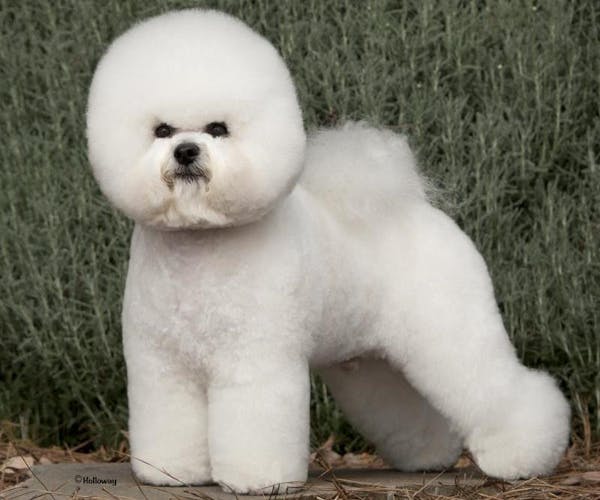With nearly six figures pumped into his care and training, Beau Lemon, a bichon frisé from Minnesota, rose through the dog show ranks to become the second best of his breed in the nation.
Beau, born Victoire Gerie's No Lemon Gemstone, won best of show twice, among several other accolades. When he retired from the show ring in 2012 at age 3, he was expected to breed with females until he turned 10 in hopes he'd pass along his legacy.
But that was cut short, owners Mary and John Wangsness alleged in a lawsuit filed in Ramsey County, when Beau's breeder had the then-4-year-old dog neutered in July 2013 without their knowledge.
"After hearing about the neutering, and I'm not overstating things at all, Mary literally cried and stayed in bed for three weeks," said John Wangsness, whose wife never fully regained her enjoyment of life before she died this past March. "She never bounced back."
The nasty legal dispute between Mary and John Wangsness and Beau's breeder, Vickie Halstead, has played out in court for about a year. The Wangsnesses alleged in the suit that Halstead acted in "vengeance" by neutering Beau because they had tried to breed him twice to a female dog, Cha Cha, without obtaining Halstead's approval, which was required in a sales contract. (Mary Wangsness had wanted a puppy from Beau.)
The suit seeks more than $50,000 in damages, but there's more at stake — about eight vials of what's believed to be Beau's frozen semen, estimated to be worth $3,000 each.
The semen is allegedly being held under Halstead's name at an Inver Grove Heights veterinary clinic. She allegedly has profited from two sales, but John Wangsness wants ownership of it. "Damn right, they're mine,"he said.
Halstead's attorney, Joseph Crosby, said at a recent hearing that there was "no factual basis" for the suit's allegations. In his answer and counterclaim to the suit, Crosby wrote: "Defendant was required to rescue Beau from the Plaintiffs in order to bring him back to health."
Crosby alleged that the Wangsnesses' neglect of Beau caused dental disease, a low sperm count, impacted anal glands, and a matted and unhealthy coat.
Crosby didn't specify how neutering Beau would address those issues, but said in his filing that it was "necessary" and that Beau would not have been bred because of his "deteriorated health condition."
An affidavit of Halstead claimed that a sales contract with Mary Wangsness did not place any restrictions on Halstead's decision to neuter Beau.
Regarding the frozen semen, Crosby said at the hearing, it belongs to Beau's brother, Beau Jangles, and that the confusion is due to the similar names.
Halstead declined to comment on the case. Crosby wrote in his answer that she did not act out of vengeance.
Top dog
Halstead's website lists Beau's accomplishments: gold-level grand champion, winner of two all-breed best of shows, one of the top five bichons in the country in 2011 and 2012.
In the competitive world of dog showing, ownership of a dog — as well as decisions about its care and profits — are often contractually shared between the breeder and the owner. On top of that, the dog may live with a trainer and rarely see its owners while competing.
Beau lived with his trainer, Bill McFadden, in California, and returned to the Wangsnesses' Twin Cities home upon his retirement.
John Wangsness said his wife had spotted Halstead's bichons in a show at the St. Paul RiverCentre and had been impressed with the fluffy white dogs that, according to American Kennel Club standards, should stand under 12 inches tall.
Soon after, they bought Beau.
Court documents show that Mary Wangsness signed a sales contract with Halstead in 2009 to purchase Beau for $3,000. Beau, who turns 7 next month, was a little over 2 months old at the time.
Seeking vindication
Wangsness said his wife's sudden interest in showing dogs was a natural extension of the years she spent riding thoroughbred horses competitively in hunter-jumper shows.
The couple, both doctors, also became friendly with Halstead.
"We considered it to be a friendship," John Wangsness said. "We did things socially."
That's why, he said, they didn't suspect anything was afoot when Halstead said in late June 2013 that she needed to obtain Beau to breed him.
"I don't think, in their wildest dreams, they would have imagined this happening," said the Wangsnesses' attorney, Larry Leventhal.
Under Halstead's guidance, the Wangsnesses invested about $94,000 to further Beau's show career, Leventhal said. Although they treated Beau as a pet, they also expected to have the option of breeding him several times a year at a rate of $2,000 to $3,000 per breeding until he turned 10.
But making money off the dog isn't the main issue, said John Wangsness. He said he wants justice for his wife, who never recovered from the pain of the situation. She had also suffered from a form of Parkinson's disease.
"I would like some vindication for the emotional distress that happened to Mary as a result of [Beau's neutering]," John Wangsness said.
Attorneys are scheduled to meet Tuesday to discuss a settlement agreement.
Chao Xiong • 612-270-4708
Twitter: @ChaoStrib

Edina could see first zoning update in 50 years

Will this be the year legislators abolish "shotgun only'' for deer across southern Minnesota?

